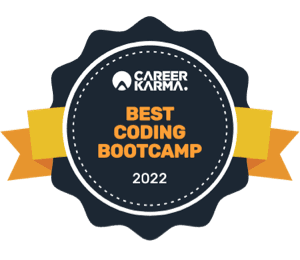 |
330+ Reviews on Career Karma |
Your New Career Starts Here
In just 19 weeks, you’ll go from a total beginner to a job-ready full-stack software engineer, writing your own applications and using AI-powered productivity tools.

In-Demand Tech & Computer Science
Our curriculum includes algorithms, data structures, networking, and databases. You’ll learn Python and JavaScript, the two most in-demand programming languages, plus state-of-the-art AI tools like GitHub Copilot. This tool helps students position themselves to compete in an evolving job market that increasingly utilizes AI tools for enhanced productivity in software development.
Leading Instructional Models
To help you build durable knowledge, we incorporate leading instructional models, including the learn/practice cycle. Learning something and putting it into practice creates mental models that stick. Each module culminates in a project so you can build an impressive portfolio to show future employers.
Training for Long-Term Career Health
Gain skills that lead to career sustainability, including how to establish and maintain healthy and supportive work relationships, use stress management to reduce fatigue and frustration, and have confidence in your decisions.
Career Services; 1:1 Coaching
Throughout your 19 weeks, our experienced Career Services team will help you prepare to land the job of your dreams. Get 1:1 coaching tailored to your skills and needs, go through mock interviews, build your professional resume, and more.
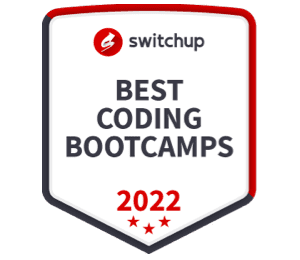 |
300+ Reviews on Switchup |
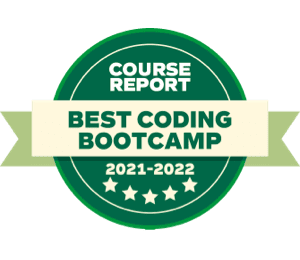 |
325+ Reviews on Course Report |
Join an Active, Supportive Community
You’re not in this alone. During the bootcamp, you’ll have our team and your classmates – and after, you’ll join a group of 14,000+ software engineers.
Join 14,000+ Alumni
Connect with thousands of alumni working as professional software engineers.
Work with 2,500+ Companies
Our engineers go on to build the future at leading tech companies. Join them after completing your beginner coding bootcamp.
Income-Contingent Financing
We offer financing options so that most U.S. residents pay a single $100 deposit and then wait to pay back tuition until after they land a job.
Boost Your Earning Potential
Find out how we track and report graduate outcomes, and how we work hard to ensure our graduates are set up for long-term career health.
Join Our Engineers At






Learn Python, JavaScript, and Build Your Project Portfolio
- Gain the skills you need to be job-ready by graduation
- Access cutting-edge curriculum so you have the latest skills
- Learn from experienced Instructors and Career Advisors
- Build a portfolio of projects to showcase your new skills and knowledge
- Demonstrate your ability to evaluate and blend AI-generated code with your own
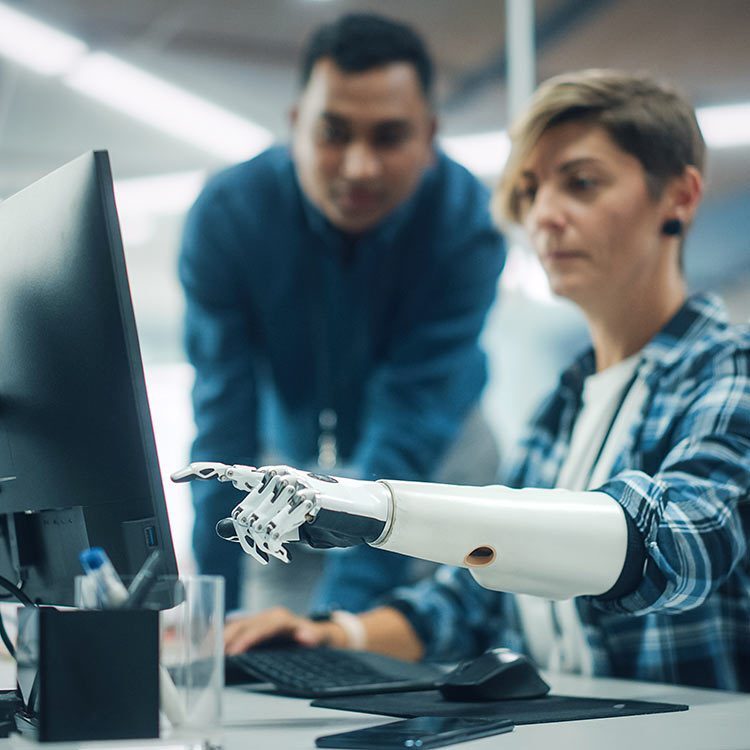
Upcoming Program Dates
Our Next Beginner Full-Time Coding Bootcamps
Class runs from 9am – 5pm Monday through Thursday, plus 10 pre-scheduled Fridays from 9am – 5pm.
We offer this course in Pacific Standard Time (PST) and Eastern Standard Time (EST).
| Cohort | Bootcamp Dates | Application Deadline | Complete Interview By | Get Started Today |
|---|---|---|---|---|
| April 2024 | Apr 29 – Sep 13, 2024 | April 19 | April 22 | Apply |
| May 2024 | May 28 – Oct 17, 2024 | May 10 | May 17 | Apply |
| July 2024 | Jul 8 – Nov 22, 2024 | June 21 | June 28 | Apply |
For additional cohort options, check availability in our admissions portal.
Schedule a Conversation with an Advisor
Our enrollment team is here to help answer your questions wherever you are in the admissions process.
Meet Our Team in an Upcoming Info Session
We’ll walk you through how you can become a software engineer in just 19 weeks at our next live online beginner info session.
Curriculum
Learn HTML, CSS, JavaScript, Python, and Build your Project Portfolio
This program takes you from beginner to job-ready in 19 weeks using a modern, module-based curriculum focused on putting new skills and knowledge into practice right away.
Dive into the world of a full-stack software engineer. These subjects represent the core knowledge and skills that are used in nearly every software engineering job.
- Turn software requirements into a running application with Python and Django
- Write HTML and CSS to build working and interactive web applications
- Use a relational database to store and retrieve data for an application
- Use Visual Studio Code (VSCode), Bash or PowerShell, and Git to create high-quality code and projects
Project: Your first project uses everything you’ve learned in the previous four weeks to build a meaningful full-stack web application. You’ll design the database, write the server code to create the responses to drive the application experience, and author the client code to render an attractive, intuitive, and responsive web application interface.
Building on the robust knowledge learned in the first module, you’ll continue by exploring how to build even more complex web applications using modern software architectural methods.
- Learn system design to model and build large software applications
- Create stand-alone web application front-ends using JavaScript and React
Project: Your second project models how you’ll work in a real-world software development team, utilizing the power of independent development in a collaborative environment. You and your team will use Agile software development practices to individually build microservices that seamlessly work together to create a robust and scalable web application.
Combine everything from the first 12 weeks with new skills to manage large amounts of data. Then learn development, security, and operations (DevSecOps) to harness the power of the cloud.
- Build near-real-time applications that automatically update all User Interfaces (UIs) with WebSockets and FastAPI
- Learn how to effectively use the AI-powered tool GitHub Copilot
- Write algorithms that work with different shapes of data
- Use different types of persistent data stores for different kinds of data with MongoDB
- Plan, create, and monitor a continuous integration and delivery pipeline with GitLab Pipelines
Project: You’ve spent weeks learning how to build robust, scalable, and interesting web-based applications. Now you get to show it all off by combining cloud-native services with your custom code. Again working as part of an Agile software development effort, you’ll design and build a durable and responsive web application using a cloud platform.
At this stage, you’ll begin your job search, leaning on the many things you’ve learned from our Career Services team during your time in the bootcamp. We’ll be right by your side, helping you find, land, and negotiate terms for the job of your dreams.
Career services during your 19 weeks include:
- 1:1 coaching sessions
- Mock interviews
- Portfolio and resume-building
- Professional development workshops
- Networking exercises
- Access to a broad alumni network
Your Beginner Full-Time Coding Bootcamp Schedule
This bootcamp is immersive. Plan on spending 40-55 hours per week in class and working on your own time. Your instructors and the rest of our team are here to support you every step of the way.
- 9:00 AM – 9:30 AM: Exploration Review
- 9:30 AM – 11:00 AM: Morning Lecture
- 11:00 AM – 1:00 PM: Practical Lab
- 1:00 PM – 1:45 PM: Lunch Break
- 2:00 PM – 3:00 PM: Afternoon Lecture
- 3:00 PM – 4:30 PM: Practical Lab
- 4:30 PM – 5:00 PM: End-of-Day Wrap-Up
Have questions about the schedule? Schedule a call with an Enrollment Advisor.

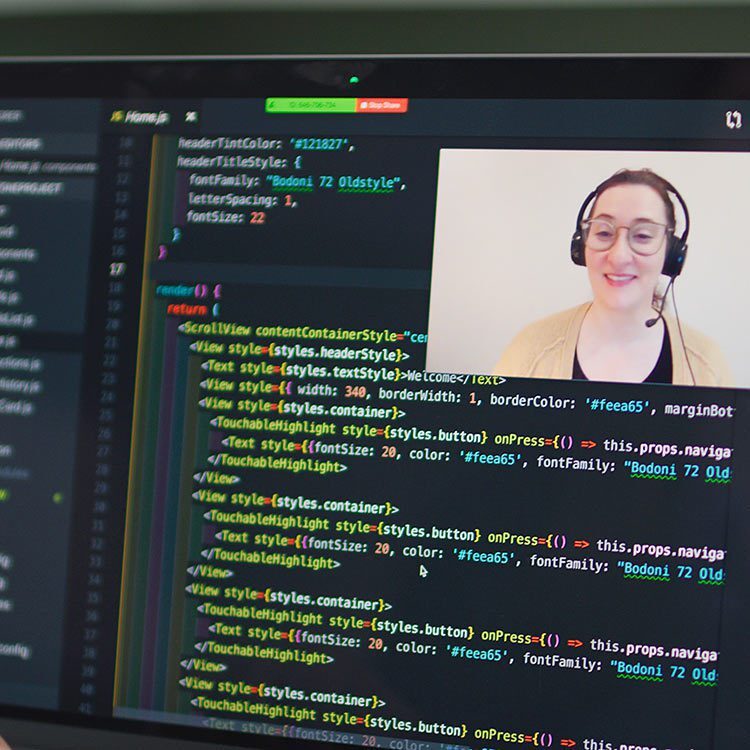
Learn a Variety of Tools & Languages
- JavaScript
- GitHub Copilot
- Python & Django
- HTML & CSS
- PostgreSQL & MongoDB
- React & Redux
- WebSockets & FastAPI
- GitLab Pipelines
Careers & Outcomes
Career Services to Help You Land a Job & Launch Your New Career
We’ll help you find, land, and negotiate the terms of your first software engineering job.
Job Search Support
Our Career Advisors will prepare you for the job search and interview process. Get the tools you need to land the job, negotiate a great offer, and launch your new career.
GitLab Project Portfolio
Build a strong and unique GitLab portfolio, featuring projects demonstrating your new software engineering skills. See some student project examples for inspiration.
Mock Interviews
Upon graduation, our team conducts mock interviews and other job training workshops and exercises to get you ready.
1:1 Coaching
You’ll have exposure to career services content throughout the entire program, and you’ll begin meeting with your Career Advisor toward the end of the program for 1:1 coaching tailored to your needs. They’ll work with you to refresh your resume, update your social channels, and start aligning your new skills with job opportunities.

Reach Your Goals in Just 19 Weeks
Take a look through our bi-annual outcomes report, which digs into the details of our graduation rates, salaries, and success rates.
Median Compensation Rate
Based on 52.2% of graduate salaries reported.
Transform your life and career.
Gain in-demand skills
Build projects you’re excited about
Go from beginner to developer
Increase your earning potential
How to Apply
Our Beginner Coding Bootcamp Admissions Process
Get started today, then move through the next steps of our beginner admissions process.
Submit Your Application
Create an account, then submit your application in 10-20 minutes.
Aptitude Test
Next, complete a 15-minute cognitive aptitude test (CCAT).
Optional Info Session
We strongly encourage all applicants to attend a live online info session.
Admissions Interview
A 15-minute non-technical interview that helps us get to know you a bit better.
Course Primers
Get Ready for the First Day
After you’ve been accepted into the bootcamp and paid your deposit, we’ll send you primer materials in the weeks leading up to your start date. These will help you review high school math and computer literacy.
You’re highly encouraged to complete these primers, as they’ll help get you into the right mindset before the first day of the program.

TUITION & Financing
Multiple Tuition Payment Options
Bootcamp tuition is $19,480. Pay in full, pay half up front, or explore other financing options, including the ability to pay after you’re employed.

Income-Contingent Financing
Through Income Share Agreements (ISAs) and Retail Installment Contracts (RICs), all we require is an upfront deposit of $100 – you pay the rest once you’re employed.
Lending Partners
Use a loan to finance your education. Our two trusted lending partners provide flexible financing options based on your needs.
Scholarships
Learn about our work with the Galvanize Foundation to fund full-tuition scholarships that seek to create new paths for more students.
Pay Up Front or Split in Two
Pay in full before you start, or pay half on the first day and the remaining balance at the midpoint.
Frequently Asked Questions
Beginner JavaScript & Python Coding Bootcamp FAQs
Explore a few FAQs, and don’t hesitate to schedule a quick call with an Enrollment Advisor to get answers to any specific questions.
Learn everything you need to know on our Beginner Full-Time Coding Bootcamp admissions process page.
The Beginner Coding Bootcamp was designed specifically for those with no coding experience. If that’s you, we invite you to dig into the admissions process.
The Beginner Coding Bootcamps cost $19,480. Explore our Cost & Financing page for more information.
Yes, though we are not able to sponsor student visas. All of our programs are offered live online, so you can attend classes from wherever you are. We’re proud to accept applications and welcome students from all over the world into our programs and look forward to continuing to do so.
As of October 2023, part-time coding bootcamps will be offered through our Tech Elevator brand.
The recent leap in artificial intelligence (AI) tools will enhance the productivity of the software engineer like nothing before it. Perhaps the greatest recipients of this technology will be our graduates, and those just starting out or entering the software engineering field.
That is why we’re proud to teach the AI-powered tool GitHub Copilot in our instructor-taught curriculum in all our coding bootcamps. Read more about our approach to teaching GitHub Copilot, and our firm belief that new coders and new software engineers should learn foundational skills before being introduced to these types of productivity-enhancing tools. For more on AI and its impact on software engineering, read a panel discussion with Galvanize experts.
Yes. We teach students how to use the AI-powered tool GitHub Copilot in all our coding bootcamps. We teach students how to integrate Copilot into their software development workflow during the later modules of all of our coding bootcamps, after proficiency in programming has been obtained. Students will use this tool to build a portfolio project (a non-trivial application) to demonstrate their ability to evaluate and blend AI-generated code with their own.
Our instructional teams, which are composed of industry veterans, have managed the responsible use of productivity-enhancement tools throughout their careers and are well-equipped to teach this newest tool.
Read more about our approach to teaching GitHub Copilot, and for more on AI and its impact on software engineering, read a panel discussion with Galvanize experts.

Ask A Question
Talk 1:1 with an Enrollment Advisor
Pick the date and time that works for you. Our Beginner Coding Bootcamp advisors can answer any questions you have and walk you through next steps.
- Questions before you apply
- Questions after you apply:
- Eastern Time Zone Cohort
- Pacific Time Zone Cohort
Start Your New Career
Apply to the Beginner Full-Time Coding Bootcamp
Complete your application in less than 20 minutes by answering a few questions about your background and professional goals.


